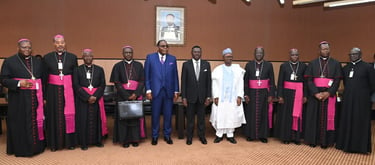
Navigating the Episcopal Role in Politics: Insights from Cameroon
Exploring the Catholic Church's National Episcopal Conference (NECC) role as a powerful moral authority in Cameroon, emerging as the most vocal critic of the long-serving regime. This post dissects the bishops' prophetic stance on corruption, electoral integrity, and the Anglophone crisis, while cautioning against partisan romance, which could very easily become a huge impediment to fulfilling their critical role in demanding justice and promoting democracy in the Central African nation.
Bryan B Bezeazu-uh
10/24/20255 min read


The Historical Context of Church and State Relations
The relationship between church and state has been a cornerstone of political philosophy and Christian theology throughout history. Early teachings of the church often emphasized a separation of spiritual and temporal powers, a notion rooted in the teachings of Jesus as reflected in the Gospels. Early church fathers, such as Augustine of Hippo, articulated the concept of a dual authority in which the church primarily concerned itself with the spiritual well-being of society, while the state managed temporal affairs. This foundational idea set the stage for complex interactions between ecclesiastical authorities and political power.
As the Christian faith spread throughout Europe, the influence of the church began to intertwine more closely with the authority of rulers. Notably, during the Middle Ages, the Papacy asserted significant political power, influencing monarchs and shaping policy across Christendom. The Investiture Controversy exemplifies the conflict over ecclesiastical authority, where the church challenged the right of kings to appoint bishops, thereby illustrating the ongoing struggle for power and autonomy. This period laid a framework where figures such as Thomas Aquinas argued for the harmony between reason, politics, and faith, reinforcing the church's role in moral and ethical governance.
With the Enlightenment came new challenges in church-state relations. Thinkers such as John Locke and Jean-Jacques Rousseau questioned established clerical authority and advocated for the principles of religious tolerance and separation between religious and governmental institutions. These ideas gained traction and influenced political developments not only in Europe but also in colonies worldwide, including Africa. In Cameroon, the historical interplay between church and state continues to reflect these broader philosophical traditions, intertwining with local traditions and colonial legacies, which shape contemporary challenges faced by ecclesiastical leaders in navigating political landscapes.
The Church's Mission: Spiritual and Social Responsibilities
The mission of the church has long been understood as a dual commitment encompassing both spiritual guidance and social responsibility. At its core, the church serves as a harbor for faith, fostering a sense of community through shared beliefs and practices. This spiritual obligation requires that church leaders uphold moral teachings, provide pastoral care, and nurture the spiritual development of their congregants. Engaging in prayer, worship, and education, the church aims to cultivate a deeper connection to faith, encouraging a lifestyle aligned with its doctrine.
However, the church's role does not end with the spiritual enrichment of its members. In addition to maintaining its religious obligations, the church must be acutely aware of the social injustices and political issues affecting its congregation and the broader community. In many societies, including Cameroon, systemic injustices can undermine the very fabric of faith and community. Thus, the church is called to advocate for the marginalized, promote equity, and demonstrate compassion in times of crisis.
It is essential that while churches engage in social issues, they remain steadfast in their spiritual mission. The balance between these responsibilities can be delicate. When addressing political matters, the church must strive to be a moral compass rather than a political powerhouse, guiding individuals to act with integrity and compassion. This involves promoting values such as justice, empathy, and respect within the context of the community, while avoiding any alignment with political ideology that could detract from its foundational mission.
In fulfilling both its spiritual and social responsibilities, the church thus serves not only as a sanctuary of faith but also as a vital entity committed to addressing the needs and concerns of its members and the society at large.
Case Study: The Situation in Cameroon
The political landscape in Cameroon has been characterized by a complex interplay between governance and religious institutions, particularly the church. In recent years, the Episcopal Church has found itself at the crossroads of social justice and political allegiance. The country's history of political instability, characterized by civil unrest and government repression, poses significant challenges for church leaders and laypersons alike. The church is often pressured to take sides in political conflicts, which could lead to a compromise of its core teachings.
One notable example is the pastoral response to the Anglophone crisis, which has escalated tensions between English-speaking regions and the predominantly Francophone government. Church leaders have voiced concerns regarding human rights violations and the plight of displaced families. They have been called upon to advocate for peace and reconciliation, a role that inherently places the church in a contentious position vis-à-vis the state. Many church leaders express apprehension concerning potential backlash from the government should they openly criticize political actions or align themselves with community grievances.
Testimonies from local clergy reveal a persistent struggle to maintain ethical boundaries while also addressing the needs of their congregations. One bishop remarked that remaining politically neutral is a challenge but essential to uphold the church's integrity and mission. Conversely, parishioners often look to the church for moral guidance and advocacy in times of turmoil. This tension is palpable, with many laypeople urging their leaders to take a stand against injustices. The consequences of church leaders compromising their teachings in favor of political favor have been significant, leading to a deepening divide within the community and diminishing trust in their spiritual guides.
In navigating this complex environment, the Episcopal Church in Cameroon exemplifies the daunting task of fostering spiritual growth while engaging with pressing socio-political issues, highlighting the delicate balance required in the modern context.
A Call for Responsible Leadership Among Church Leaders
In the complex political landscape of Cameroon, the role of church leaders is increasingly pivotal. As spiritual guides, they hold the profound responsibility to protect and nurture their congregations, akin to a shepherd safeguarding his flock. The moral obligation of these leaders extends beyond spiritual guidance; they must also act as vigilant stewards against the vulnerabilities that their communities may face from political exploitation. This responsibility calls for a deep sense of empathy, as church leaders must strive to comprehend the fears and challenges confronting their congregants.
The current political climate, marked by frequent manipulation and opportunism, demands that church leaders actively resist any political entanglements that could lead to the exploitation of their believers. By fostering a clear understanding of ethical engagement, these leaders can promote stability and trust within their communities. This includes advocating for justice, equality, and human dignity, ensuring that members are well-informed about their rights and the dynamics of power that may affect their lives.
Furthermore, church leaders are encouraged to prioritize connection with their communities. Establishing open lines of communication creates a space for dialogue and expression, allowing congregants to share their concerns and aspirations. This proactive approach not only fortifies the relationship between the church and its members but also cultivates an environment where leaders can effectively address the issues that may arise from political activities that threaten the community’s cohesion.
In conclusion, the call for responsible leadership among church leaders in Cameroon cannot be overstated. Embracing a paternal role, characterized by ethical engagement and community connection, empowers them to fulfill their duty as protectors of their flock. By prioritizing these values, they can ensure that their congregations are resilient against the perils of political manipulation, fostering a culture of respect, care, and collaboration within the society at large.
The EACCR
Programs
Contact Us
EACCR Columbus © 2025. All rights reserved.
Ministry Formation
+1(740) -214-6347
Bible Studies
We prioritize spreading the Truth and bringing healing over relying on Ads.
Please help us maintain this focus by considering a donation in faith today.
God Bless You!
